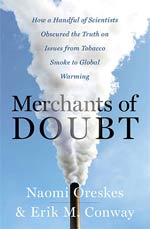A Merchant of Doubt attacks Merchants of Doubt
Posted on 20 December 2010 by John Cook
 Two things are required to put the climate 'debate' in context - an awareness of the many lines of evidence that global warming is happening & that humans are the cause - and an understanding of the techniques used by climate skeptics to sow doubt and obscure the full body of evidence (quick plug, both these themes are fleshed out in the free booklet, The Scientific Guide to Global Warming Skepticism). A must-read historical perspective is provided in Merchants of Doubt by Naomi Oreskes and Erik Conway, which shows that the same people who sowed doubt about climate science also used the same techniques (and even the same arguments) to sow doubt about the effects of smoking, ozone depletion and other impacts of industrial activity on the environment. Predictably, one of the Merchants of Doubt, Fred Singer, has come out attacking the book. Unsurprisingly, he has used the same obfuscating techniques in his attack. It's like watching the sequel to the book unfold in real time.
Two things are required to put the climate 'debate' in context - an awareness of the many lines of evidence that global warming is happening & that humans are the cause - and an understanding of the techniques used by climate skeptics to sow doubt and obscure the full body of evidence (quick plug, both these themes are fleshed out in the free booklet, The Scientific Guide to Global Warming Skepticism). A must-read historical perspective is provided in Merchants of Doubt by Naomi Oreskes and Erik Conway, which shows that the same people who sowed doubt about climate science also used the same techniques (and even the same arguments) to sow doubt about the effects of smoking, ozone depletion and other impacts of industrial activity on the environment. Predictably, one of the Merchants of Doubt, Fred Singer, has come out attacking the book. Unsurprisingly, he has used the same obfuscating techniques in his attack. It's like watching the sequel to the book unfold in real time.
What Singer attempts is a classic strawman argument, attacking an argument that the book never actually made. Singer argues:
Oreskes' and Conway's science is as poor as their historical expertise. To cite just one example, their book blames lung cancer from cigarette smoking on the radioactive oxygen-15 isotope. They cannot explain, of course, how O-15 gets into cigarettes, or how it is created. They seem to be unaware that its half-life is only 122 seconds. In other words, they have no clue about the science, and apparently, they assume that the burning of tobacco creates isotopes -- a remarkable discovery worthy of alchemists.
All one has to do is read the relevant section of Merchants of Doubt to find Singer has completely misrepresented the words of the book:
Seitz saw irrationality everywhere, from the attack on tobacco to the "attempt to lay much of the blame for cancer upon industrialization." After all, the natural environment was hardly carcinogen-free [Seitz] noted, and even "the oxygen in the air we breathe ... plays a role in radiation-induced cancer". (Oxygen, like most elements, has a radioactive version -- oxygen 15 -- although it is not naturally occurring.)
Ironically, the sentiments on oxygen isotopes actually come from Frederick Seitz, one of the original Merchants of Doubt. In no way does the book suggest the burning of tobacco creates oxygen-15 isotopes. Fred Singer's attempt to discredit Merchants of Doubt only further reinforces the rhetorical techniques illuminated in the book. Singer attacks Oreskes' and Conways' understanding of the science by completely misrepresenting their understanding of the science.
H/T to Tim Lambert at Deltoid.































 Arguments
Arguments






























So I consider the blogs a snapshot in time - often blog posts are actually rebuttals being added into the rebuttal section. Then over time, subsequent blog posts feature updates to the rebuttals (a good example is Greenland ice loss which is constantly updated as observations find the ice sheet is losing ice at a faster rate as time goes on). So yes, there is some duplication of content as the rebuttals mirror the blog posts. An additional complication is having 3 levels of rebuttals - we debated at length what to do about comments. Do you have 3 different sets of comments or one set of comments for all 3 rebuttals. I opted for the simplest option (and not just because it was the least amount of work) of having a single set of comments. If you can think of a better way to do it, I'm all ears. :-)
That might be appropriate if each level rebuttal had its own comments thread but currently there is one comments thread for all 3 levels. That decision isn't locked in stone, I *may* split it into 3 levels down the track.